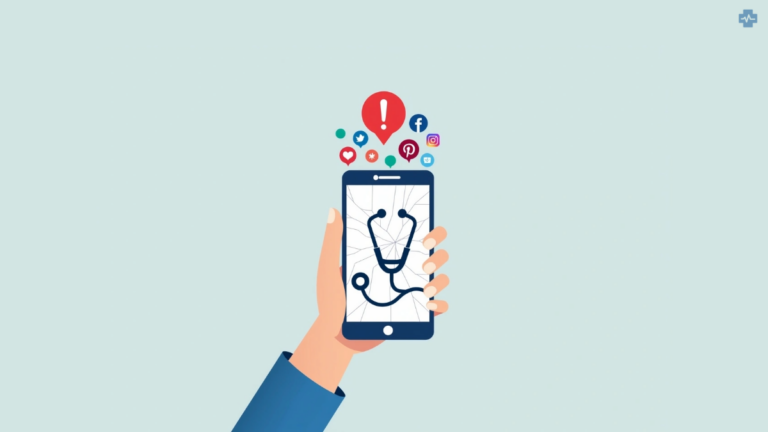News articles have reported that an increasing number of teenagers are diagnosing themselves with medical conditions, following exposure to misinformation on social media platforms.
One of the areas of concern relates to the platform, TikTok, which has been linked to many young people diagnosing themselves with ADHD, following exposure to TikTok videos. More and more teenagers are believing they have ADHD as a result of the video content, in spite of the fact that fewer than half of the 100 most-viewed ADHD videos on TikTok contain content which meets with the clinical guidelines for the disorder.
It is estimated that around 3 to 7 percent of the adult population is currently living with ADHD. The condition is characterised by impulsivity, inattention and hyperactivity.
Studies Show Social Platforms Subject to ‘Confirmation Bias’
A study on social media platforms and their effectiveness in psychoeducation has been conducted by PLOS (Public Library of Science) One. According to the study, TikTok videos are designed to be short, snappy and ‘easily digestible’. This means that they don’t always capture the subtle nuances required for an accurate diagnosis.
At the same time, the TikTok algorithms ensure that the videos viewed by users and shared to their accounts usually align with their existing tastes, preferences and beliefs. This can create something called confirmation bias.
Furthermore, repeated exposure to pre-existing beliefs enforces the perception that content is credible and reliable. This phenomenon is known as the ‘echo-chamber effect’.
Expert Warns Against Over-Pathologising Symptoms

The problem with children watching social media and then self-diagnosing themselves is highlighted by Jennifer Katzenstein, Ph.D., director of psychology, neuropsychology and social work, as well as co-director of the Centre for Behavioural Health at John Hopkins All Children’s Hospital in St. Petersburg, Florida.
Katzenstein explained that children often watched influencers online and then self-diagnosed themselves. Self-diagnosis doesn’t just happen with ADHD. Others have self-diagnosed themselves with obsessive compulsive disorder (OCD), autism, anxiety or depression. At the same time, content across different social media platforms, and not just TikTok, has led users to believe they have certain health or psychological conditions.
“Some of my teen patients have mentioned content from social media platforms during therapy sessions,” she says. She explains how they often feel they have symptoms which relate to content they have viewed online. Her experience has been that many ‘over-pathologize’ a symptom, which is actually within the range of normal.
She suggests to parents and caregivers to show empathy when teens or younger children come to them expressing concern they have a psychological condition following online exposure. “I emphasize the importance of a comprehensive evaluable by a qualified mental health professional to determine an accurate diagnosis,” she says.
According to information provided by Silver Linings Clinic, self-diagnosis following social media exposure can result in incorrect conclusions, primarily because psychological disorders are complex and should be diagnosed by a professional. Symptoms of various disorders also overlap, and so it can be difficult to give a correct diagnosis without professional training and expertise.
Seeking a professional for a clear and accurate diagnosis is imperative as self-diagnosis might prevent an individual from getting the right help and treatment needed. For example, if someone starts taking the wrong supplements for a condition they have incorrectly diagnosed themselves. Self-diagnosis can also result in increased anxiety and distress over a condition which simply does not exist.
Why Are Young People More Susceptible to Self-Diagnosis?
According to John Hopkins Medicine, the trend of young people misdiagnosing themselves is happening for a number of reasons. Children seeking validation and understanding, and those in the stage of life where they are developing autonomy and finding their identities are especially vulnerable to the relatable content of influencers online.
Adolescents, in particular, are vulnerable to self-diagnosis.
The current reports expressing concerns over ADHD self-diagnosis by young people as a result of TikTok exposure highlight the need for parents to be vigilant in communicating with their children. Children are encouraged to see further than the content on TikTok or social media platforms, and to take their entire daily personal experiences into account.
Also, asking for the opinion of a mental health professional is paramount, given the multi-layered nature of psychological conditions. The fragmented, at times, simplistic and isolated content on social media simply doesn’t take the complexity of the human condition into account.
While awareness of mental issues is important and communication around mental health conditions is essential; exposure to misinformation and incomplete information online can be harmful.
A headline from one of the recent news articles summarises the message effectively: ‘TikTok is full of ADHD advice – just don’t trust it for an accurate diagnosis’.

